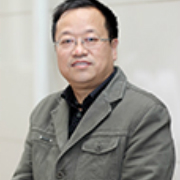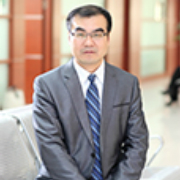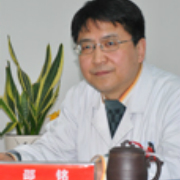- 十种习惯让你更易得癌症
- 乙肝预防讲“策略”
- 转-------自身免疫型肝炎...
- 诊断非酒精性脂肪性肝炎 哪种病...
- HCV患者的个体化治疗??台湾...
- [AASLD2011]大会亮点...
- HCV患者的个体化治疗??台湾...
- 慢性丙型肝炎肝纤维化的检测与治...
- 我院新近再为2例患者作干细胞移...
- 2010版《慢性乙型肝炎防治指...
- 莫西沙星可能导致肝功能衰竭
- HCV无应答者的三联治疗方案
- 入胞抑制剂带来治疗乙肝新希望
- 围产期防护HBV传播
- 解读HBV的生活周期
- 再生医疗新进展:可攻克诸多难症...
- 肝炎与降酶药
- 2011年核苷(酸)类似物抗病...
- (转帖)7月28日世界肝炎日 ...
- 脐带血造血干细胞库设置管理规范...
- 自体骨髓干细胞再生术治疗肝硬化
- 肝硬化患者生活调理三要素
- 生活中防癌7招
- 急性肝炎患者的饮食原则
- 急性肝炎患者的食物宜忌
- 中国乙肝疫苗诞生35周年庆典在...
- 治疗重型肝炎 人工肝支持系统关...
- 抗病毒治疗是关键
- 抓住慢乙肝抗病毒治疗的关键点
- 优化治疗首次写入乙肝防治指南
- 治疗乙肝,没有捷径可走
- 慢性乙型肝炎防治指南(2010...
- 肝纤维化:研究热点和新进展
- “疫苗治乙肝”有望年底完成临床...
- 庄辉:我国乙型肝炎防治现状及目...
- 非酒精性脂肪性肝病诊疗指南
- 酒精性肝病诊疗指南
- 慢性乙肝处理亚太共识:更新
- 我院确诊发热伴血小板减少综合征...
- 干细胞
- 丙型肝炎的现代治疗
- 慢性丙型肝炎治疗:优化与发展
- 注意脂肪肝必做7件事
- 慢性乙肝各种抗病毒药物比较,含...
- 干细胞的研究
- 自体干细胞移植治疗肝硬化腹水概...
- 骨髓干细胞移植适应症、禁忌症、...
- 骨髓干细胞移植技术安全性
- 关于开展自体干细胞移植治疗肝硬...
- [AASLD2011]大会亮点和Ⅲ型干扰素在慢性丙型肝炎治疗中的地位??T. Jake Liang访谈
- 作者:赵建学|发布时间:2012-01-01|浏览量:680次
T. Jake Liang
美国NIH NIDDK肝病研究组组长、终身高级研究员,第62届AASLD年会主席
Hepatology Digest: One of your recent studies showed that the robust induction of type III interferons and chemokines defines a unique pattern of hepatic innate immunity response to hepatitis C virus infections. Would you give us a brief introduction to the role of type III interferons in HCV infections and its possible role in therapy?
《国际肝病》:您最近的一项研究显示III型干扰素和趋化因子的大量诱导阐释了肝脏对HCV感染特有的固有免疫应答模式。您能给我们简要介绍一下III型干扰素在HCV感染中的作用吗?
Dr Liang: Type III interferon is a type of interferon that has been known for many years. It has not received the same kind of attention as type I and type II interferon (interferon-alpha and interferon-gamma), basically because these interferons have gained attention as antiviral substances produced by the body. Type III interferon is different but has been shown to work similarly to type I interferon. Because of the similarity, there is no major evidence supporting the importance of this type of interferon in disease and it has not received a lot of attention. Fortunately in the last few years there have been seminal studies using genome-wide association studies which have identified particular genetic variations in the type III interferon gene which were very highly linked to treatment response and recovery from HCV infections. This has generated a lot of interest in this particular type of interferon because of these implications and that is why we have started work on it in the last few years. What we have found is that actually, HCV infection in the liver induces more type III interferon than type I interferon. Interferon is induced in response to viral infections and a lot of study has been done into type I interferon in viral infections, but very little done on type III. This is obviously a very significant finding and we have not been looking at the right pathways; we have been focusing on type I whereas perhaps we should be focusing on type III. The implications of this is whether this has anything to do with therapy and if we can improve it and as it stands, type III interferon is available in the clinic now and is used to treat hepatitis C. Whether it is going to be better than type I, we don’t know, but there has been a lot of interest generated by type III interferon. It is the very beginning of it and it is a new field in HCV research.
Liang博士:人们多年前就发现了Ⅲ型干扰素,但它却没有像Ⅰ、Ⅱ型干扰素那样被重视(干扰素α、γ),而现在因其为机体自身所产生的抗病毒物质引起了人们的关注。Ⅲ型干扰素作用特殊,但已有证据显示,它与Ⅰ型干扰素作用类似。目前仅限于这种作用的相似性上,还缺乏更有利的证据证明此类型干扰素在治疗疾病上的重要作用,因此关注度不高。幸运的是最近几年,有很多开创性的基因组相关性研究表明,Ⅲ型干扰素的部分基因变异与HCV感染患者的治疗应答和恢复密切相关,使得这种干扰素的关注度提高,这就促使我们开始对Ⅲ型干扰素进行深入研究。我们发现,HCV在肝内诱导产生的Ⅲ型干扰素较Ⅰ型干扰素多。这对提高治疗效果是否有意义?目前Ⅲ型干扰素已经在临床用于治疗丙型肝炎。究竟能否获得比Ⅰ型干扰素更好的疗效,还没有答案。Ⅲ型干扰素已经成为丙型肝炎治疗研究领域的新成员。
Hepatology Digest: As President of this year’s AASLD Meeting, could you share with us the most exciting features of this Liver Meeting?
《国际肝病》:作为今年AASLD大会的主席,您认为本届大会最大的亮点是什么?
Dr Liang: This Liver Meeting has been conducted for 56 years and certainly we are very proud of the fact that we have been able to organize the premier liver meeting internationally. We have more than 8000 attendees at our meeting and it is a forum for people to share ideas, to discuss scientific advances, to talk about clinical management and so on. These are the so-called abstract submissions that outline what people are working on and to share with the profession. We have about 3000 abstracts this year and a lot of people want to come here to present their work, so it is really, first and foremost, the most exciting forum for people to come and share their research and clinical investigations. Other than that, we have been focusing more on education that is science-driven but not abstract-driven. We feel that we need to do a much better job in terms of educating our colleagues in areas such as treatment of hepatitis C and the new paradigm treatment, and other diseases such as fatty liver disease and through to liver transplantation. Our meeting is not just a meeting of hepatologists; it is a multi-disciplinary meeting including radiologists, surgeons, pathologists and basic scientists. So it really crosses all disciplines and it is exciting in a way that we don’t focus on just one thing. There are so many things going on and everybody can get a lot out of it. I think it is really exciting that our education program can teach the bread-and-butter of hepatology issues and then we have science-driven cutting-edge content to give us a view of the horizon. This combination has been developed, for example, specifically in response to the new emerging treatment paradigm for the direct-acting antivirals against hepatitis C, and we have organized an education symposium outlining the pros and cons and all of the nuances of the new treatment paradigm with the goal of educating. That is a new initiative this year and we think it will be very well attended. Also we have worked very closely with advocacy groups to raise awareness of the public health organizations of the federal government to demonstrate that this is something that needs to get more attention as a significant public health problem in the US today. This encompasses all forms of hepatitis; obviously hepatitis B and C receive the most attention but we often hear about outbreaks of hepatitis A and there is hepatitis E also which has become more important. We are working very closely with advocacy groups and they will be attending this meeting and presenting their action plan on dealing with the public health implications of hepatitis. This is exciting in that we have practical advances in treatment as well as a concerted effort on the part of the public health offices to draw attention to the public health issues in the US and indeed globally. What happens here will certainly have an impact elsewhere such as in Asia. We continue to work very closely with our Asian colleagues.
Liang博士:AASLD年会已经走过了56个春秋,我们为能组织国际最高级别的肝病会议而感到自豪。参会人数逐年增加,今年已超过了8000人次,会议为与会者提供了相互交流、讨论学科进展、探讨临床治疗方案等的机会。通过提交的大会论文摘要,可以了解正在开展的研究,便于同行间交流。越来越多的研究者希望能够在AASLD展现自己的研究成果,今年共计收到摘要3000篇。除了展示基础与临床研究成果外,我们对教育投入了更多的关注,努力使抽象化教育变得更有科学基础。AASLD年会是真正跨学科会议,内容除肝病学外,还涉及放射学、外科学、病理学和基础科学等更多交叉领域。教育课程中,我们讲授实用基本的问题,而在其他报告中又会带给大家具有科学基础的尖端技术展望,。今年,针对对新型直接抗HCV治疗药物应答的病例,我们组织了教学研讨会,为达到教学目的,我们列出了正反两方面的论据以及所有新治疗方案间的细微差别。这种新的教育课程方式是今年新开设的,我们认为这种形式极具吸引力。我们还与宣传团体密切合作来提高联邦政府公众健康组织对各型肝炎的认识,向他们展示肝炎是目前美国明显存在的公众健康问题。当然,当前对乙型肝炎和丙型肝炎的关注度最高,但是我们也经常会听到甲型肝炎的爆发以及越来越多的HEV的感染。宣传团体将会参加这次会议,并对肝炎相关的公众健康问题提出他们的行动计划。
Hepatology Digest: You mentioned one of the hot topics is the direct antivirals. Can you give us some more information on that?
《国际肝病》:您提到最热门的话题是直接抗病毒药物治疗。您能更详细的介绍么?
Dr Liang: Basically this is a really new class of drugs that have been worked on for many years and finally we have a product that shows significant improvement in combination with current treatments in treating patients with viral hepatitis C. There are many different forms of direct antivirals now that they have been developed and the data for many of these drugs will be released at this meeting. I would encourage your readers to visit our website where we will be posting many of these presentations and abstracts for everyone to access. We believe in global education and the best way to do that is through the internet.
Liang博士:这是进行了很多年研究的新药,现在终于有了成品。这种新药在联合目前治疗方法治疗丙肝患者时,显示出很好的提高疗效。目前我们开发了很多不同形式的抗病毒药物,这次会议上会展示很多药物的相关数据。欢迎你的读者来访问我们的网页,我们会在上面公布很多相关介绍、摘要,每个人都可以去浏览。我们的理念是全球教育,而网络是最好的媒介。
Hepatology Digest: You mentioned that there are over 3000 abstracts that have been submitted at this meeting and you have picked ten of them to review. What is the criterion for selecting those ten out of the more than 3000 abstracts?
《国际肝病》:您提到这次会议提交了3000余篇摘要,您挑了10篇在媒体见面会上发布,您挑选摘要的标准是什么?
Dr Liang: I will say it is my President’s prerogative to do that and I chose these abstracts not to minimize the importance of the all of the other thousands of abstracts but for me it was more of an attempt to highlight different areas in the field of liver disease. I intentionally picked abstracts that are diverse and representative of different areas and a couple that I think are at the cutting edge of research now and probably in the future. I am using my crystal ball to predict future advances particularly in the area of stem cells in medicine. I wanted to present a real cross-section of the disciplines at this meeting and mainly for the benefit of the press and media audience. I have tried to focus on topics that can be easily understood in terms of their public health relevance and not necessarily the molecular mechanisms of how things work. It is important to get across, for example, how much better the new direct antivirals are than the current treatment and what the problems that may arise with these drugs are. It has been my decision and I had to be very selective. Intentionally I did not choose any of the direct antiviral abstracts although there are hundreds of them here, because I don’t think the field has matured enough and the importance of DAAs is already well accepted, so there is no reason for me to go through individual DAA abstracts. So I chose abstracts that were a little unique and different and maybe neglected in certain areas and worthy of being brought back into the spotlight.
Liang博士:我得承认这是我做主席的特权,我挑选了这些摘要并不意味着忽视其他几千篇摘要,我只是要强调肝病的不同领域。我挑选的摘要都是不同领域的典型代表,以及我认为在目前或在不久将来处于前沿地位的研究,例如:干细胞医学领域。为了新闻媒体听众的利益,我想在这次会议上表现出学科的真正全貌。我尽力选择那些容易理解的关于公众健康相关的话题,而不一定是有关分子机制的问题。要让大众容易理解是很重要的,例如,新的直接抗病毒药物治疗效果能比目前治疗效果高出多少?这些药物可能带来什么问题?在摘要挑选时,我故意没有选择直接抗病毒药物方面的摘要,尽管这方面的相关摘要有上百篇,但是我认为这个领域还不够成熟,同时直接抗病毒药物的重要性已经被我们接受。因此,我挑选的摘要有点特殊,这些摘要可能会被其他人忽视,但却值得引起我们的注意。
Hepatology Digest: There is now a special interest group at the Liver Meeting that focuses on HCV. Can you tell us the story behind the development of that special interest group?
《国际肝病》:目前在肝病会议上有关注丙型肝炎的特殊兴趣小组。您能告诉我们特殊兴趣小组的进展么?
Dr Liang: The whole concept of special interest groups started about four or five years ago to provide a forum for people with shared interests to be able to connect with each other when they attend the meeting to share their ideas and educate each other. It is very different from the rest of the meeting where abstracts are submitted and they are selected to make presentations. This allows people with common research interests to get together to present their work and maybe even form networks of researchers to address complex problems. That is really the impetus behind forming special interest groups. Over the years the special interests groups have grown in leaps and bounds and their members are very active and even have their own educational programs. This year there are five symposiums that are driven by the special interest groups. Now we have eleven and the hepatitis C interest group is the most recently formed just this year. It gives them a voice and they have organized the HCV Education Symposium and a lot of time and effort has been put in to produce a great program. They have some very capable leaders who help us to deal with many other issues as well. Hepatitis C is such a complex issue; it goes well beyond just treatment, but also prevention, reimbursement and public health issues. There are a lot of things involved so we really need this component of the organization that can take primary responsibility for that. They do a wonderful job. The special interest groups are open to anybody who wants to join and they have their own business meetings, group meetings and conference courses, so it’s a great way for our members to get involved in the organization.
Liang博士:特殊兴趣小组的完整概念形成于4、5年前,它提供了论坛供具有共同兴趣的人们互相联系,当他们参加会议时互相分享想法、互相学习。这与提交摘要,挑选摘要并展示的其他形式会议有很大的不同。这种会议允许有共同研究兴趣的人们,集中到一起,发布他们的工作,并有可能形成研究网络来解决复杂问题。这是特殊兴趣小组形成的真正动力。他们的成员很活跃,甚至有自己的教育课程。今年特殊兴趣小组召开了5个研讨会。现在我们有11个兴趣小组,丙肝兴趣小组是今年刚刚建立的。这种会议提供了他们一个说话的机会,他们已经组织了丙型肝炎教学研讨会,花费了大量时间和精力来制定教程。他们有很有能力的领导,帮助我们处理了很多事情。丙型肝炎是很复杂的问题,它不光涉及到治疗,还有预防、报销、公众健康等问题。有很多事情要处理,所以我们确实需要这个组织来负责这些事情。他们的工作相当出色。特殊兴趣小组对所有想要加入的人开放,他们有自己的商务会议、小组会议、讨论会议,因此加入该组织对我们的成员是很有利的。
TA的其他文章:




